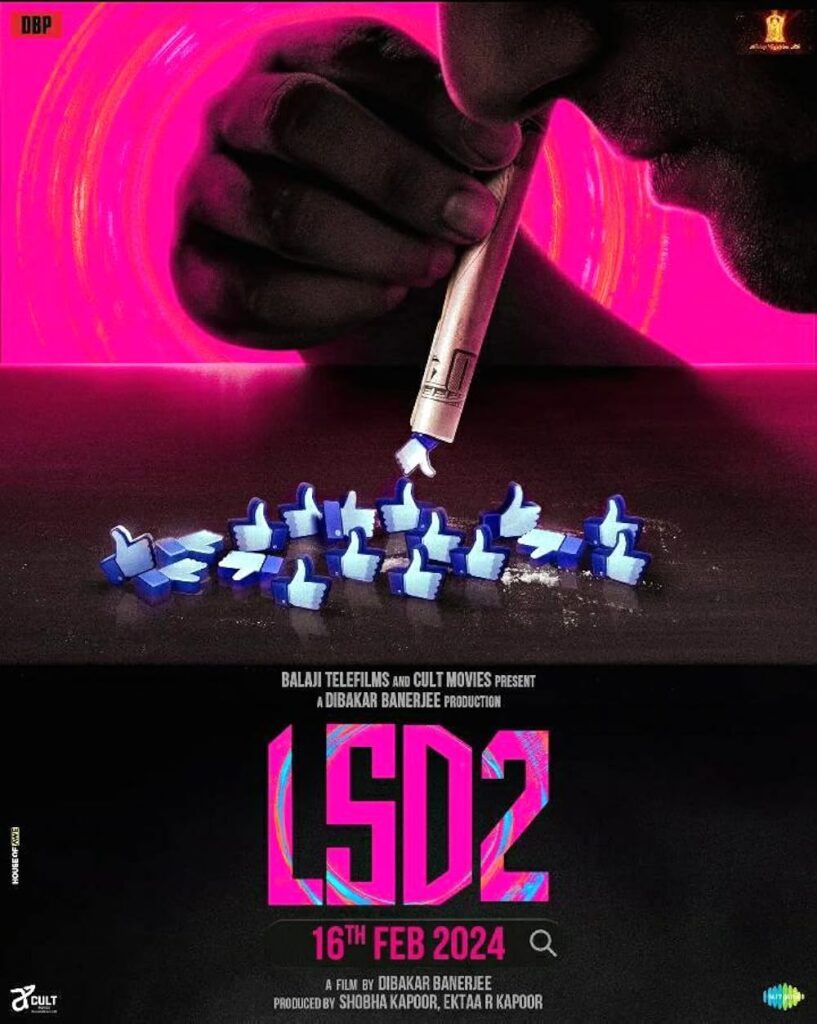LSD 2 : Love Sex Aur Dhokha 2
Introduction
Throughout the narrative of Love Sex Aur Dhokha 2, there is a searing political commentary lacing the narrative – be it a couple of characters walking past the sign board stating ’75 Years Of Independence’ or a Muslim character being arrested for no fault of his or even a bus driver being arrested for a supposed crime of bullying in a school that he was oblivious of. These political commentaries are synonymous with Dibakar Banerjee who has never really shied away from making statements. Even in the first Love Sex Aur Dhokha, there was a searing commentary on love jihad that laced the first act of the film, a drama back in the day which was so ahead of its time while being nothing more than an experiment with its grainy footage. But in 2024, when everything is digital and the world is grappling under the threat of Artificial Intelligence amongst some of the other forms of chaos in the lives of the Gen Zs, the prolific filmmaker is back with another experiment on the lines of Love Sex Aur Dhokha, titled Love Sex Aur Dhokha 2 aka LSD 2. Only this time, there are more cameras in every nook and corner of the room while depicting largely a digital meta world that we find ourselves in. So then, does Love Sex Aur Dhokha 2 aka LSD 2 manage to impress, let’s find out.
Story & Screenplay
Love Sex Aur Dhokha 2 aka LSD 2 carries the legacy of the first film in terms of its soul while introducing three loosely intertwining stories around topics of Love, Sex and Dhokha in the modern day setup featuring the Gen Zs(perfectly represented by the poster of the film with likes in the form of drugs being snorted). And because the film features the Gen Zs, there are new labels to the story that largely captures the various facets of the reel world – be it reality TV, the concept of metaverse or the traumas of social media. So invariably ‘Love’ becomes ‘Like’, ‘Sex’ becomes ‘Share’ and Dhokha becomes ‘Download’. And each of the tales represent the histrionics of the digital world that is a house to alternate versions of ourselves which are distant versions of the real world, and therein lies the searing commentary that runs almost as an undercurrent. The screenplay standing at a shade under two hours is eccentric, trippy, flashy but worth pondering upon, given the kind of issues that it wishes to address. But the subject in itself is niche and therefore the drama is experimental partly acting as a colourful mess which is inviting in many ways while also doubling up as a social mirror on where we find ourselves in the world that is rapidly becoming digital with every passing minute.
I must admit one thing straight up that the writing isn’t as sharp as the first LSD film. But it is also reflective of the complex times that we find ourselves in wherein the times from the early 2010s felt so simplistic in comparison to today(as things keep getting complicated while typing this review). So the drama labeled as ‘Like’ opens with a reality show which seemed like a crossbreed of Big Boss and Jhalak Dikh Laa Jaa titled ‘Truth Or Naach’. In this show, you are introduced to a character, a seemingly empowering transgender woman who continuously wishes to stay in the limelight through the show. Her popularity is directly proportional on the kind of sensationalism that she resorts to, while laying out a narrative of her mother reluctantly standing by her against all odds to forming an intimate bond with her choreographer to even faking her gender identity. This, while the makers offer her an option of ‘off camera’ wherein she would run the risk of losing out on the popularity points. The histrionics of a reality show isn’t new at all wherein we have all been consistently manipulated by the sob stories of various contestants. More so, the writing exposes them in a rather playful manner almost as a satire featuring sponsors who rule the roosts with creative decisions around contestants taken around their popularity and their image. So even the worst kind of sensationalism often results in a meltdown by the judges who act according to what is fed in their ear-pieces. And so the manipulation game begins and ends just in the name of entertainment and ‘likes’.
The second drama titled ‘Share’ is closest to the political commentary that you would associate with a Dibakar Banerjee film. This features the case of a transwoman whose unconscious body is identified by a vlogger until a police inquiry reveals a heinous crime committed. Amidst this hoopla is a protagonist belonging to an NGO who offers to help thereby representing a gentle kind of a person. But soon it begins, a twisted game of a twisted narrative which is far from the actual truth wherein the victim of the heinous crime is a victim of politics and capitalism with a clear demarcation in the power hierarchy that forms an integral part of our society even today. This involves punishing the weak and suppressed for no real reason while maintaining an image that is aligned with the public perception of the company or the person in general. This includes twisting rules to suit a narrative by simply exploiting the loopholes in question(seems familiar?). By the end of it, the only person that has actually lost is the victim herself, been brutally sandwiched between her reality and the politics of capitalism.
The third drama titled ‘Download’ is by far the most eccentric and digitally relevant unboxing of the Gen Z era. This includes a young teenager, a youtuber and a gamer who attains massive popularity of reaching 10 Million Followers on Youtube following a deepfake video of his that goes viral. A minor event in the second story forms a crucial part in this third act wherein popularity is shown to come at a cost. This drama never really dwells deep into the psyche of the teenager being severely affected by the turn of events around him. And that is quite deliberate, given how Gen Zs don’t prefer to dwell deep in the psyche while continuing to be materialistic. Even the role of media is briefly used as a political tool with concepts of AI and Metaverse that form an alternate world of calmness much contrary to the chaos in the actual digital world. The satirical commentary on all of us being consumed by a lot of content online is the common thread across each of the three tales while creating an inviting and trippy picture of our reality that continues to be dangerous by the minute(although jazzy I must say). The screenplay is really well written and if you really wish to enjoy this experiment then do keep a close tab on the themes that tackles the internet culture rather effectively throughout the narrative.
Dialogues, Music & Direction
The dialogues represent the lingo of the internet culture really well which is also cringe at times but also a reality of the times that we live in. The music is crass personified that works oddly well with the themes of the drama and ends up being a massive plus in the context of the narrative. The BGM perfectly emphasizes on the massive highs and the ultra lows of the internet through a score that enhances the drama at various junctures. The cinematography is excellent almost having a frame within a frame at any given point of time. This ensures that there is an impression of the digital world that is painted in the minds of the viewers thereby adding authenticity to the subject matter. The editing is outstanding and weirdly enough, it is the editing that holds the narrative together. There are multiple switches between the reality show to a first person framing to the social media frames and eventually the metaverse. This essentially meant that you needed a prolific editor to tie all these aspects seamlessly in the narrative, something that actually happens, and beautifully. Director Dibakar Banerjee has yet again excelled in a very different kind of a film that has pushed the boundaries of experimentation(and kudos to Ekta Kapoor and Balaji Films To back this subject). His ability to allow the viewers to be silent spectators to a deliberate hot mess which is inviting and dangerous in equal measures is quite incredible to witness. The histrionics and the chaos created through situationa of sensationalism was a treat to watch while also allowing space to ponder on the negative facets of the internet and technology. The direction is excellent here.
Performances
The performanced are excellent by the ensemble cast. Rossana Elsa, Rahul Raj Chenichery, Urfi Javed and Anusha have their moments to shine in extended cameos that definitely make you stand up and notice them. Anu Malik, Tusshar Kapoor and Sophie Choudry perfectly depict the meltdown of the judges of a reality show, and each one of them is deliberately over the top which was the need of the hour. Mouni Roy as the anchor of the reality show gets her emotions absotutely spot on by adding touches of realism which are often meant to misguide the viewers all in the name of TRP. Gurleen who essays the role of the news anchor at the end is outstanding while perfectly representing the histrionics of the media filled with sensationalism in today’s world. Jayashree VR as the reality show contestant is incredible to witness and she does a smashing job here.
Swaroopa Ghosh is such a fine actor and she is simply outstanding here as Noor’s mother who enters a reality show with uninhibited intentions(that included giving retakes in the garb for popularity of her ‘son’). Swastika Mukherjee delivers a very dignified performance while possessing a sly trait of a character in power, often conflicted but still resorting to the ways of capitalism as instructed by her Firm. Abhinav Singh as the teenage youtuber and gamer Paapi Gamer is amazing to witness while balancing his uninhibited self with doses of vulnerability. Bonita Rajpurohit as Kullu is brilliant here and one of the few characters in the fray with no real vested interests. You almost empathize with her character who is a victim of circumstances while people around her continue to use her. Paritosh Tiwari as Noor was a very complicated character given how he had to ‘pretend’ to be a transwoman, all in the name of popularity and driving a certain public image in a reality show. And he was incredibly good here, often getting most beats of his rather wicked character on point.
Conclusion
Love Sex Aur Dhokha 2 aka LSD 2 is an experimental film that is mostly definitely a niche and will divide opinions amongst its viewers. But if you are willing to surrender to the vision of the filmmaker then you will realise that it is a brilliantly trippy unboxing of the f**ked up and chaotic metaverse of the Gen Z that makes for an outstanding watch. It is a reminder that the internet culture is often sold to be glitzy and attractive but it actually is very dangerous. Available in a theatre near you and Highly Recommended!




